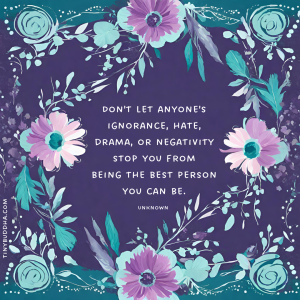
“The quality of your life is in direct proportion to the amount of uncertainty you can comfortably deal with.” ~Tony Robbins
“Uncertainty” may be one of the least popular places to hang out.
I hear this all the time from my clients, friends, and truth be told, from the voice inside my own head. Certainty is almost always preferable to uncertainty. Humans like to know.
I wanted to know when our house was on the market last year. Would it sell? When would it sell? How much would we get? Should we start packing up closets now, or wait until the offers start rolling in?
I found it difficult to be in the moment with all of that uncertainty swirling around. It felt so difficult, in fact, that I found myself creating action steps that were not yet necessary—such as packing up closets—in an attempt to distract myself from the uncertainty-induced anxiety I didn’t want to feel.
Similarly, I really wanted to know when I was forming my business a few years ago.
Rather than revel in the excitement of the unknown, I wanted certainty. I wanted to know what it would look like in one year and in ten years. Where would my clients come from? What would my days feel like? I wanted to know exactly how everything would fall into place.
Mostly, I wanted a guarantee that it would “work” the way I hoped it would. Faith wasn’t going to cut it. The thrill of anticipation? No, thank you.
I had no interest in fuzzy details or that wide open place where you’re not sure what’s happening but anything is possible. I would have taken certainty any day of the week.
Wide open views and unlimited possibilities aren’t all they are cracked up to be.
Most of us, it seems, want to know. We want to know where we’ll live, what our next career will look like, and how it will all go down.
It almost doesn’t matter if what we know is accurate, beneficial, or true.
We aren’t searching for truth or clarity or insight as much as we’re simply searching for something reliable to grab ahold of.
But the more I’ve worked to foster inner peace and the more I’ve tested the uncertainty waters with curiosity and a little less fear, the more I think uncertainty gets a bad rap. Maybe it doesn’t have to be so bad.
Here are four steps we can take to make uncertainty bearable. Exciting, even.
But let’s start with bearable…first things, first.
1. Know that you’re not seeing every option.
When uncertainty strikes, our mind goes to work trying to predict how things will turn out. We choose from the options that are apparent to us—the ones we can see in the moment. But those options are never the whole story.
In the middle of uncertainty around my new business, I could only see a couple very limited possibilities. I could fail miserably. That possibility was clear. Or I could squeak by. Those were about the only options I could even fathom.
Although something in me knew that there were many, many more possibilities, I continually came up blank.
In the middle of uncertainty-induced anxiety, our vision narrows, literally and metaphorically. Fight-or-flight takes over and our vision literally focuses sharply while our brain diverts resources to survival, leaving no energy for creative problem-solving.
So, relax.
Know that this is what is happening and remind yourself that there are options that you can’t possibly see right now. Just because you don’t see them doesn’t mean they aren’t there.
Acknowledge that there is a whole lot that you don’t know that you don’t know—and that some of those unknown, currently unforeseeable options will make you very, very happy.
In five, ten, twenty years from now, you will feel grateful for things you can’t even imagine today.
2. Fight the urge to concretize.
Let your thoughts be fluid. Allow them to float in and out of your mind rather than making them rigid or fixed.
When we want to know what’s going to happen, we do what Pema Chodron calls “concretize our thoughts.” We make them feel real and solid, like concrete. They become unyielding, even when they are so often fear-based and not true.
Rather than turning your frantic thoughts into concrete, allow them to float by as if on water. Encourage mental movement so that better thoughts can eventually float in.
3. Lean into it.
“I’m not sure what’s coming but I’ll handle it” is better than, “What’s going on here?!?”
“The unknown feels scary, but I’ve been here before” is much better than, “This feels like torture!”
Again, it’s about slowing down your thoughts a little. Soften them, take the edge off, and lean into uncertainty.
No one is suggesting you dive in head first and savor every second of it. Not yet, anyway. Just dip a toe in the water and see that you can “do” uncertainty.
Like most things in life, it’s scarier to think about than it is to actually experience.
4. Look back at everything that has turned out okay.
Remember all the uncertainty in your past and how it always worked itself out. It really has, hasn’t it?
Certainty is an illusion. It’s not real and it has no real connection with how well things turn out.
Try to remember a few times when you felt completely lost and uncertain only to experience an amazing outcome.
I remembered when I was trying to get pregnant. My husband and I tried for a year and a half before we finally saw a positive test result.
And now, watching my two year old run around and looking back on those 18 months that felt like torture at the time, I see so clearly that everything turned out exactly the way it was always meant to. The timing was perfect.
You have these experiences too. I know you do.
There are moments of uncertainty in life. There always have been and there always will be. Sometimes things turn out the way you want them to, sometimes they don’t.
Accepting the uncertainty rather than trying to fight it, remembering that there are amazing outcomes you can’t predict right now, and leaning into it help make it infinitely more tolerable.
Once you’ve mastered “tolerable,” maybe you can take that leap to actually reveling in the wide open possibilities of uncertainty. But first things, first.
About Amy Johnson
Dr. Amy Johnson is the author of several books, including The Little Book of Big Change: The No-Willpower Approach to Breaking Any Habit. She is also the creator of The Little School of Big Change, an online school that helps people find lasting freedom from habits and anxiety. Please go here to get a free sneak preview of the school.













 Though I run this site, it is not mine. It's ours. It's not about me. It's about us. Your stories and your wisdom are just as meaningful as mine.
Though I run this site, it is not mine. It's ours. It's not about me. It's about us. Your stories and your wisdom are just as meaningful as mine.